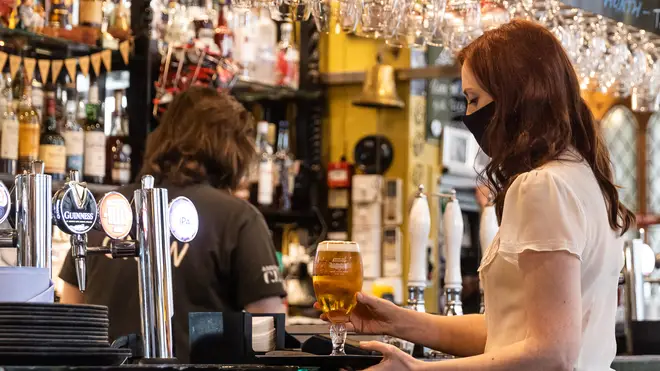
Boxing Day Special with Shelagh Fogarty 1pm - 3pm
11 June 2021, 22:50

Prime Minister Boris Johnson will announce on Monday whether a final easing of coronavirus restrictions in England will go ahead on June 21.
The Government has said the decision to lift restrictions will be based on four tests.
These are: whether the vaccine rollout is continuing successfully; if evidence shows vaccines are reducing hospital cases and deaths among people who have been vaccinated; that infection rates are not risking a surge in hospital cases that would put unsustainable pressure on the NHS; and that the Government's assessment of the risks has not been fundamentally changed by new variants of concern.
Based on these four tests, the latest data offers a mixed picture.
Read more: 30,000 new cases of 'more transmissible' Delta Covid variant in last week, PHE data shows
Read more: Vaccines minister says Matt Hancock was not 'economical with the truth' on PPE
Cases, infections and hospital admissions are all rising, although still well below the peak of the second wave of the virus; the vaccines are continuing to prove successful in reducing the number of deaths; but there is new evidence that the Delta variant of Covid-19, which first originated in India, is now responsible for up to 96% of new cases - with a 60% increased risk of household transmission compared to the Alpha variant, which originated in Kent last year.
-An end to all legal limits on social contact
-Nightclubs will be allowed to reopen
- There will be no restrictions on the size of weddings or other gatherings,
-Large audiences will be allowed to return and for events such as theatre performances
-It has not been confirmed if social distancing will be scrapped

Yvette Cooper: 'The reports of Long Covid took me back to my 20s.'
The proportion of people testing positive for coronavirus in England has increased in recent weeks.
Around one in 560 people in private households in England had Covid-19 in the week to June 5 - up from one in 640 in the previous week, according to estimates published on Friday by the Office for National Statistics (ONS).
It is the highest level since the week to April 10.
Read more: Joe Biden 'sympathetic' and 'actively engaged' in Harry Dunn case, PM says
Read more: Police officer at G7 summit tests positive for Covid
These figures are still very low compared with the peak of the second wave in January; the latest estimate of one in 560 people is the equivalent of 0.2% of the population, well below the 2.1% estimated at the start of the year.
But the downwards trend in infections since January has gone into reverse, with the latest numbers continuing to show an increase, the ONS said.

Why are we donating 100 million Covid doses to the rest of the world?
North-west England had the highest proportion of people of any region in England likely to test positive for coronavirus in the week to June 5: around one in 200.
South-west England had the lowest estimate: around one in 1,920.
Meanwhile the rate of new confirmed cases of Covid-19 in England is now at its highest level for three months.
A total of 60.1 cases per 100,000 people were recorded in the seven days to June 7 - the highest since March 5.
The rate hit 680.6 per 100,000 at the peak of the second wave in early January.
Some 34.3 million first doses of Covid-19 vaccine have now been delivered in England - the equivalent of 77.5% of the adult population.
A further 24.7 million second doses have also been given, meaning 55.8% of people aged 18 and over are likely to be fully vaccinated.
The Government has said it is on target to offer all people aged 50 and over both doses of vaccine by June 21, and for all adults to be offered a first jab by the end of July.
Vaccine take-up varies among different age groups, however.
The latest available breakdown from NHS England, showing vaccinations up to June 6, shows 91.8% of people aged 80 and over have had both doses of vaccine - suggesting 8.2%, or around one in 12, are not yet fully vaccinated.
Some 97.4% of 70 to 79-year-olds are estimated to be fully vaccinated, along with 90.8% of people aged 60 to 69 and 72.5% of those aged 50 to 59.
There are also differences in take-up among other groups.
Only 68.7% of staff in older adult care homes are estimated to be fully vaccinated, compared with 90.5% of residents of these homes.
Some 88.8% of people classed as clinically extremely vulnerable have had both doses, though for London this figure is just 79.5%.
And 68.7% of those aged 16 to 64 classed as 'at risk' or a carer have received both doses of vaccine, dropping to 66.6% in north-west England and 58.8% in London.
The figures suggest there continue to be some groups of the population where the level of protection offered by both doses of Covid-19 vaccine is lagging behind the rest of the country.